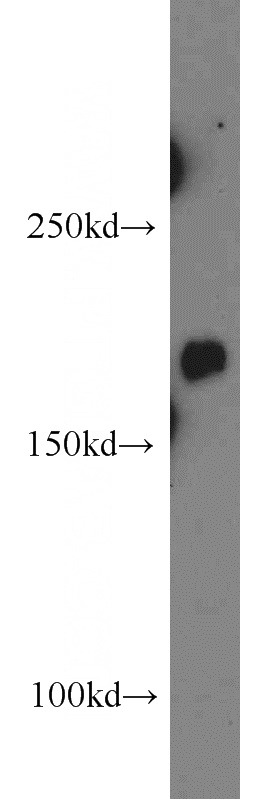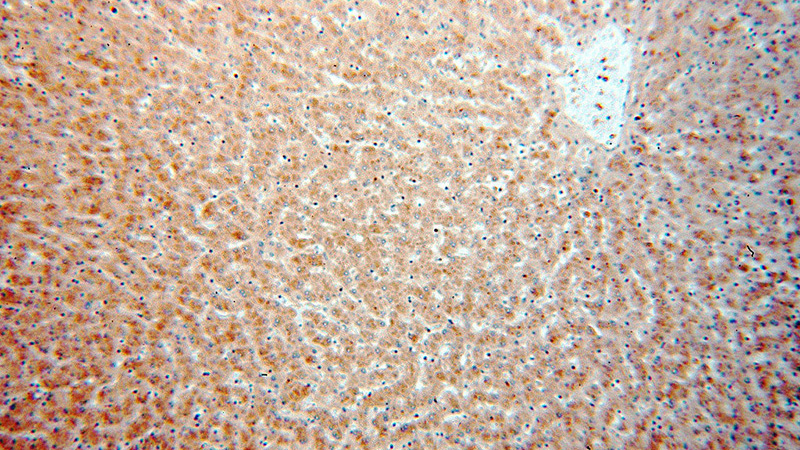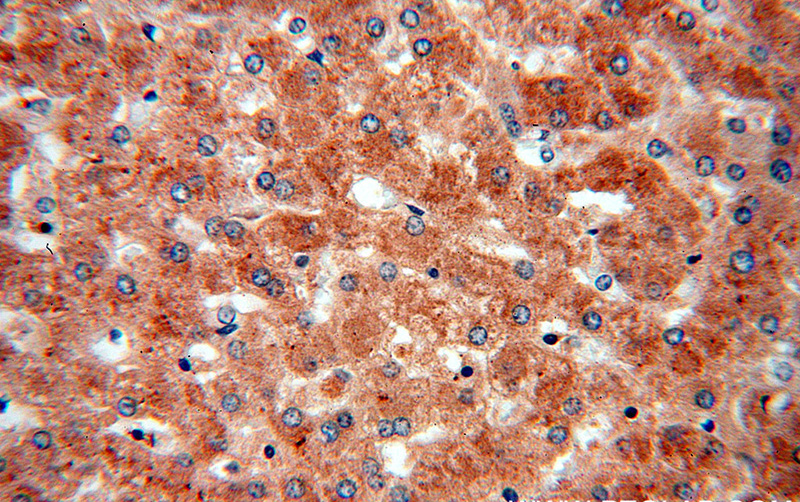-
Product Name
PTCH1 antibody
- Documents
-
Description
PTCH1 Rabbit Polyclonal antibody. Positive IHC detected in human liver tissue. Positive WB detected in mouse brain tissue, A431 cells, HeLa cells. Observed molecular weight by Western-blot: 161 kDa
-
Tested applications
ELISA, WB, IHC
-
Species reactivity
Human, Mouse; other species not tested.
-
Alternative names
FLJ26746 antibody; FLJ42602 antibody; HPE7 antibody; NBCCS antibody; Patched antibody; patched homolog 1 (Drosophila) antibody; Protein patched homolog 1 antibody; PTC antibody; PTC1 antibody; PTCH antibody; PTCH1 antibody; PTCH11 antibody
-
Isotype
Rabbit IgG
-
Preparation
This antibody was obtained by immunization of Peptide (Accession Number: NM_000264). Purification method: Antigen affinity purified.
-
Clonality
Polyclonal
-
Formulation
PBS with 0.02% sodium azide and 50% glycerol pH 7.3.
-
Storage instructions
Store at -20℃. DO NOT ALIQUOT
-
Applications
Recommended Dilution:
WB: 1:200-1:2000
IHC: 1:20-1:200
-
Validations

mouse brain tissue were subjected to SDS PAGE followed by western blot with Catalog No:114262(PTCH1 antibody) at dilution of 1:500

Immunohistochemical of paraffin-embedded human liver using Catalog No:114262(PTCH1 antibody) at dilution of 1:50 (under 10x lens)

Immunohistochemical of paraffin-embedded human liver using Catalog No:114262(PTCH1 antibody) at dilution of 1:50 (under 40x lens)
-
Background
PTCH1 (patched homolog 1) is a twelve-pass transmembrane protein that acts as a receptor of Hedgehog signaling pathway (PMID: 8906794). Hedgehog pathway plays a critical role in embryonic development and tissue homeostasis, and its dysregulation has been implicated in many human diseases including congenital disorder and cancer (PMID: 23719536; 23532857). In the absence of Hedgehog proteins (SHH, IHH and DHH in humans), PTCH1 represses the activity of Smoothened (SMO). Binding of Hedgehog proteins to PTCH1 inhibits the repression of SMO, resulting in the activation of downstream targets through the Gli transcriptional effectors (PMID: 23719536; 17139287). The gene of PTCH1 is considered to be a tumor suppressor gene. Mutations of this gene have been associated with basal cell nevus syndrome, esophageal squamous cell carcinoma, trichoepitheliomas, transitional cell carcinomas of the bladder, as well as holoprosencephaly.
-
References
- Li Y, Zhang D, Chen C, Ruan Z, Li Y, Huang Y. MicroRNA-212 displays tumor-promoting properties in non-small cell lung cancer cells and targets the hedgehog pathway receptor PTCH1. Molecular biology of the cell. 23(8):1423-34. 2012.
- Gurung B, Feng Z, Hua X. Menin directly represses Gli1 expression independent of canonical Hedgehog signaling. Molecular cancer research : MCR. 11(10):1215-22. 2013.
- Gurung B, Hua X, Runske M. PTCH 1 staining of pancreatic neuroendocrine tumor (PNET) samples from patients with and without multiple endocrine neoplasia (MEN-1) syndrome reveals a potential therapeutic target. Cancer biology & therapy. 16(2):219-24. 2015.
- Hung HC, Hsiao YH, Gean PW. Learning induces sonic hedgehog signaling in the amygdala which promotes neurogenesis and long-term memory formation. The international journal of neuropsychopharmacology / official scientific journal of the Collegium Internationale Neuropsychopharmacologicum (CINP). 18(3):. 2015.
- Duan F, Lin M, Li C. Effects of inhibition of hedgehog signaling on cell growth and migration of uveal melanoma cells. Cancer biology & therapy. 15(5):544-59. 2014.
- Zhang L, Zhou Y, Cheng C. Genomic analyses reveal mutational signatures and frequently altered genes in esophageal squamous cell carcinoma. American journal of human genetics. 96(4):597-611. 2015.
- Trnski D, Sabol M, Gojević A. GSK3β and Gli3 play a role in activation of Hedgehog-Gli pathway in human colon cancer - Targeting GSK3β downregulates the signaling pathway and reduces cell proliferation. Biochimica et biophysica acta. 1852(12):2574-84. 2015.
- Pang P, Shimo T, Takada H. Expression pattern of sonic hedgehog signaling and calcitonin gene-related peptide in the socket healing process after tooth extraction. Biochemical and biophysical research communications. 467(1):21-6. 2015.
Related Products / Services
Please note: All products are "FOR RESEARCH USE ONLY AND ARE NOT INTENDED FOR DIAGNOSTIC OR THERAPEUTIC USE"
